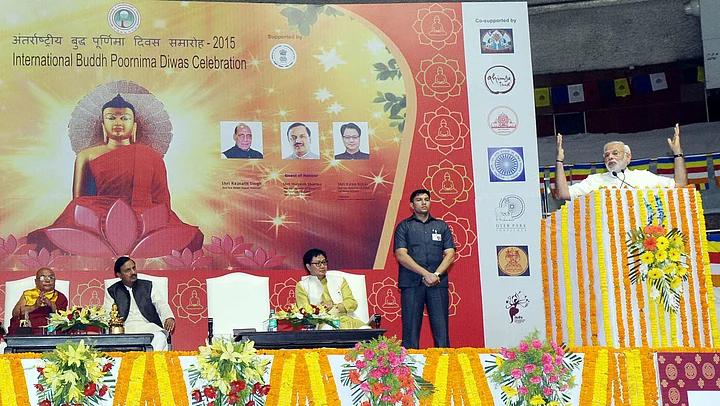For the Narendra Modi government, global politics is entering a new phase and South Block mandarins are not hesitating to proliferate visions of the role the Buddha and Buddhism will play in the external affairs ministry’s foreign policy goals, especially in South-East Asia and the Far East.
The projection of this “soft power” – the ability to attract people to one’s own side without coercion – is being seen as an effort to compete with China and in its traditional sphere of influence in countries of the ASEAN bloc. It could also be that the Modi dispensation’s foreign policy objectives are aimed at striking a spiritual link with China which of late has resorted to active promotion of Buddhism.
Watch: Narendra Modi addressed an event to mark Buddh Poornima in New Delhi
Beijing’s energetic furtherance of Buddhism – hosting the World Buddhist Forum gathering in 2006, 2009 and 2012 – was considered aggressive enough for the UPA regime to convene the first Global Buddhist Congregation in 2011 followed by teaming up with Myamnar to organize an assembly of Buddhist scholars in Yangon the next year.
But under Modi, who will soon embark on his China visit (followed by Mongolia and South Korea), the external affairs ministry sees Buddhism’s cultural and political values as the key sources of its soft power aimed to pursue hard power. While this by itself is not a unique feature in India’s foreign policy, at least in relation to countries in South-East Asia and the Far East, the Buddha has suddenly assumed a central place in the country’s diplomatic initiatives.
It has now reached a point where competitive appropriation of the Buddha, with all of Buddhism’s cultural trappings, is at the heart of Sino-Indian rivalry, if any. On May 4 – Buddha Purnima – Modi joined the Chinese microblogging site, Weibo, which is an equivalent of the global Twitter.
New Delhi’s capacity to make Buddhism attractive in a globalizing marketplace of ideas rests on the important aspect of the Buddha’s attainment of nirvana at Bodh Gaya in Bihar, as opposed to the Chinese emphasis on Lumpini in Nepal as the “enlightened one’s” birthplace. The government is already examining the possibility of allowing tourists from all countries where Buddhism is the major religion to seek visa-on-arrival facility for Bodh Gaya which last year recorded 225,668 visitors.
Add to this, the fast-tracking of the Buddhist Tourist Circuit, which envisages giving a fillip to tourism across Bihar, Madhya Pradesh, Maharashtra and Odisha, and there is a distinct attempt to communicate a favourable image of India involving both state and non-state networks. Buddha diplomacy is now being perceived as a persuasive instrument of foreign policy.
It is in the realm of Buddhism and centred around Bodh Gaya that India could have an edge over China which, despite the slow and gradual relaxation of successive governing regimes towards practice of religion in general and of Buddhism in particular, continues to be repressive as far granting full religious freedom is concerned.
The Chinese ruling elite remains hostile towards the Dalai Lama who New Delhi could leverage to establish deeper links not only with the exiled Tibetans sprinkled across India, but also generations of those in Lhasa who have grown up to experience a more mellowed Communist authority in the Tibetan capital and Beijing. The Tibetan spiritual leader has publicly stated that Chinese president Xi Jinping, unlike other Communist leaders, lays greater stock in the role Buddhism plays in Chinese culture.
The Modi government’s Act East mantra, the cornerstone of its partnership with South-East and the Far East, has the subtle touch of marketing Buddha and Buddha diplomacy. Since coming to power in May last year, foreign minister Sushma Swaraj has visited Myanmar, Singapore and Vietnam whose prime minister Nguyen Tan Dung was the first leader from SouthEast Asia to be hosted by the government following President Pranab Mukherjee’s visit there in September last year.
Remember that Modi’s active foreign visits opened with Bhutan, a predominantly Buddhist nation, followed by Nepal. Significantly, Modi chose to land in Kyoto and not Tokyo during his Japan visit. Kyoto is considered the meeting ground of Indian and Japanese civilizational heritage and his visit to the Toji temple in that city symbolised not just Buddhism but marked a huge leap forward in India-Japan strategic partnership in general and defence and nuclear cooperation in particular.
For India Buddha tourism has indeed emerged as a key factor in rebalancing power equations in its neighbourhood in South-East and East Asia. But whether India will be able to take advantage of China’s muscle flexing in the South China Sea, which has caused much disquiet in its neighbourhood, will depend upon how consistently and effectively New Delhi is prepared to pursue its Buddha diplomacy. In the least, the government could give a boost to the much-neglected Buddhist heritage sites and invest a great deal more than it already does to preserve and promote them.
As the Buddha said: Work out your own salvation.
